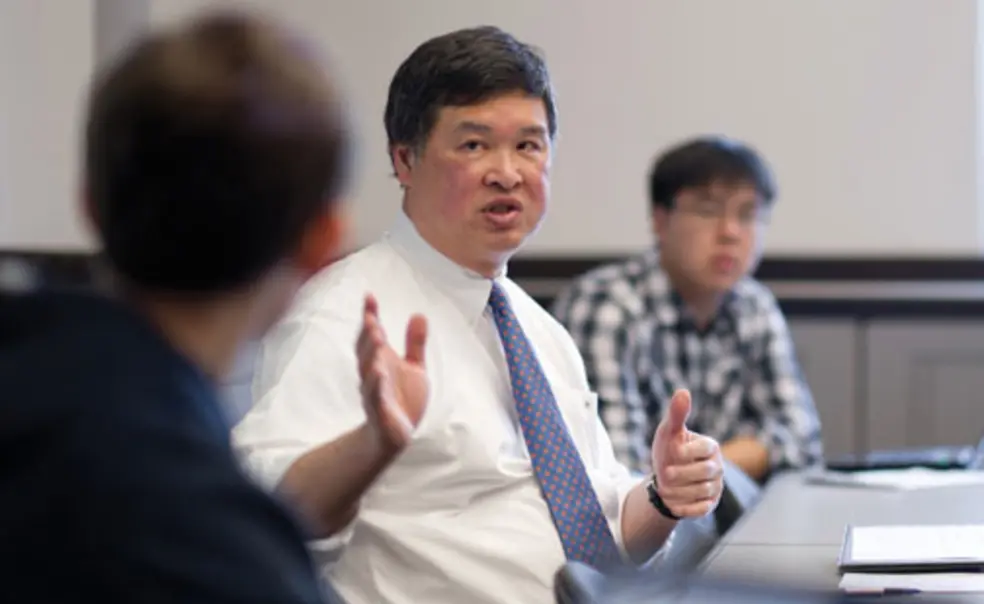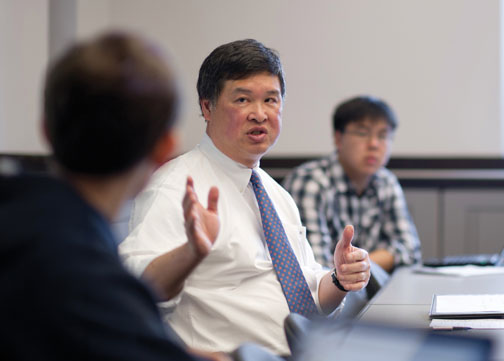Studying literature, law from an Asian-American perspective
Denny Chin ’75 is best known as the judge on high-profile cases such as the Madoff scandal and the long-running dispute between publishers and Google over digitized books. The students in one Princeton class know him as something else: their professor.
In the fall, Chin, a judge on the Second Circuit Court of Appeals, was co-teaching “Asian-American Literature and Cultures: Law, Bodies, and the Everyday” with Anne Cheng ’85, professor of English. The course was the first in a series of Asian-American studies classes Cheng has planned.
“I’d never done anything that combined the law, English, and history,” said Chin, who also teaches legal writing at Fordham University School of Law. “But I think it helped all of us in the class, whether Asian-American or not, think about our identities and backgrounds, justice, and the legal system.”
The course’s 21 students explored Asian-Americans’ role in U.S. history through significant legal cases that were paired with works of literature and films responding to issues those cases raised.
After studying the “Tokyo Rose” trial, in which a Japanese-American broadcaster was wrongly convicted of treason against the United States for participating in propaganda broadcasts during World War II, they read Chang-rae Lee’s Native Speaker — the story of a Korean-American who struggles to fit into American society and becomes a spy.
Though this is not the first course on Asian-American studies taught at Princeton, Cheng is leading an effort to offer a regular series of classes.
“It does seem like a glaring absence, given that we now have the Center for African American Studies, a certificate for Latin American studies, but not Asian-American studies,” said Cheng.
Students and alumni have sought a formal certificate program in Asian-American studies for more than 40 years. In 1995, 17 students staged a 36-hour sit-in at Nassau Hall demanding courses in Asian-American and Latino studies.
“Asian-Americans have contributed to making up what America is,” said Charles Du ’13. “To not have that perspective at a place like Princeton is really surprising.”
Creating a formal program is important, Cheng said, but her goal is more immediate: making sure courses are offered each year. She chose to start the series with literature and law to help students understand the Asian-American community’s important role in American history, she said.
“One of the things I hope the course pointed out is that for how small a percentage of the population Asians were in the 19th century, it’s astonishing how crucial a role they played in how America imagined its borders, citizenship, and naturalization,” she said.
Though many of the cases took place several decades ago, Chin said, they are just as relevant today, especially after 9/11.
“The question of racial profiling, of sending 120,000 Japanese-Americans into concentration camps without hearings just because of their race — unfortunately those issues are still with us today,” he said.
Tara Ohrtman ’13 said the course legitimized Asian-American history as a subject worth studying.
“For once in my life, I got to sit down with a group of people happy to discuss history I’ve heard my family talk about that was never discussed in an academic setting,” said Ohrtman, whose grandparents were among the Japanese-Americans sent to government “relocation centers” after the 1941 attack on Pearl Harbor. “It showed my family and personal history weren’t a special interest, but part of mainstream American history.”













No responses yet